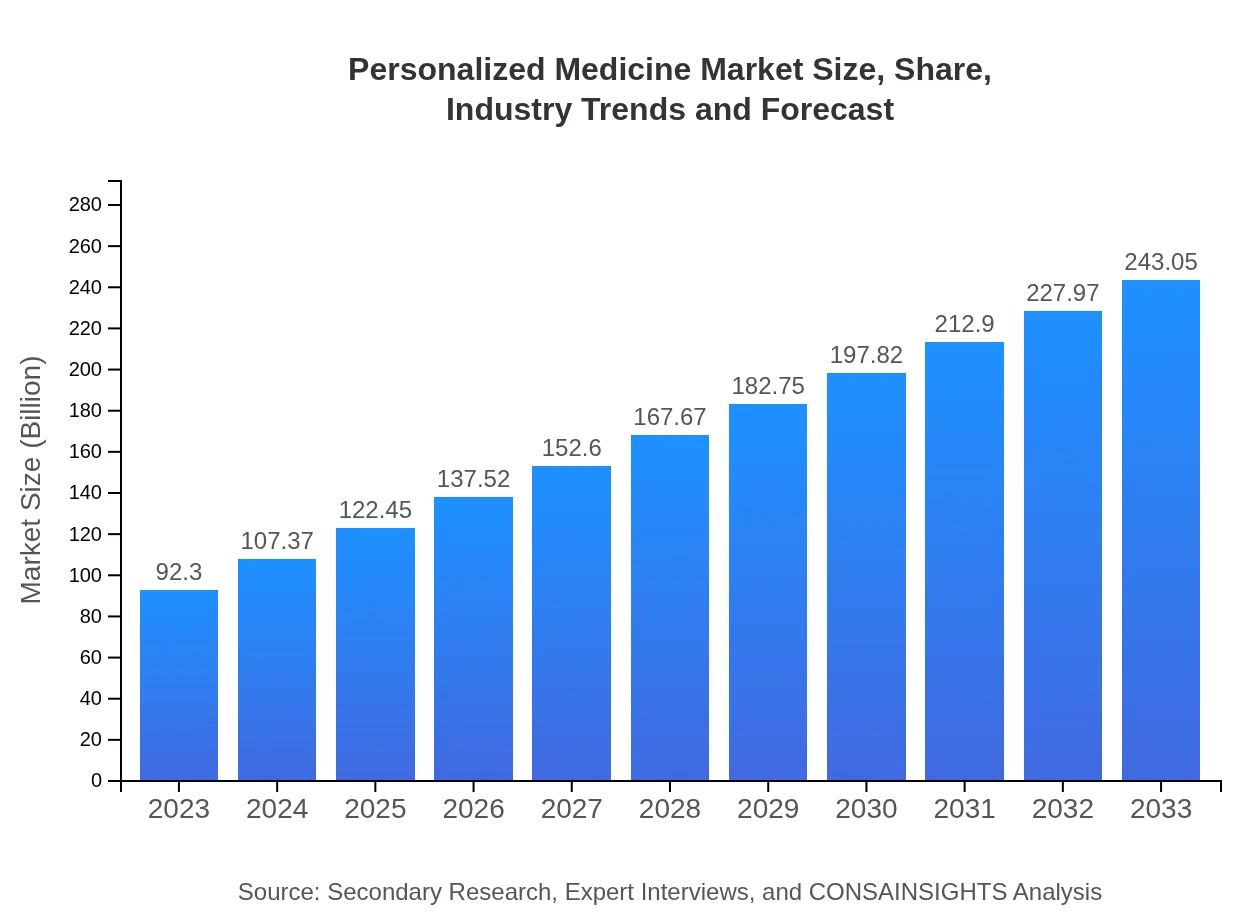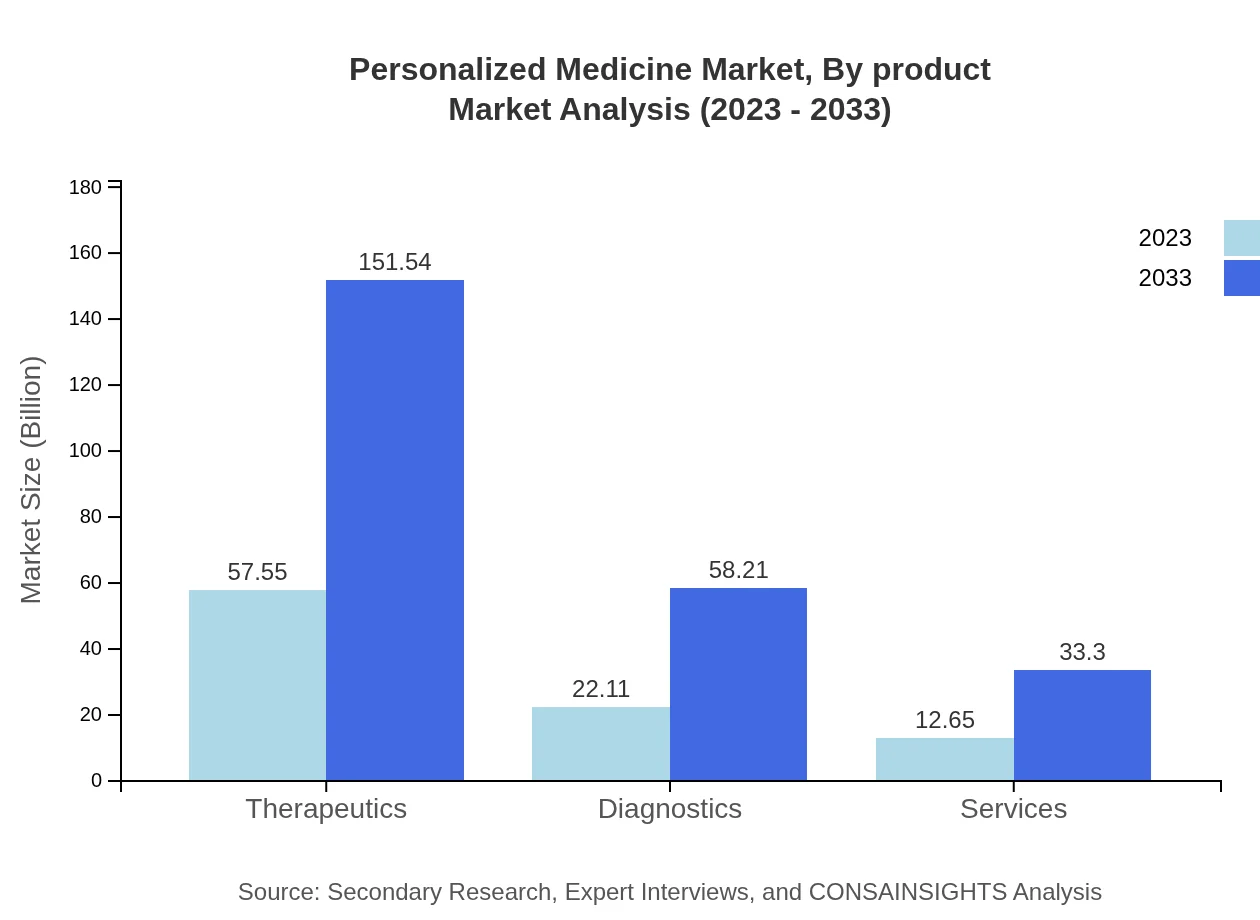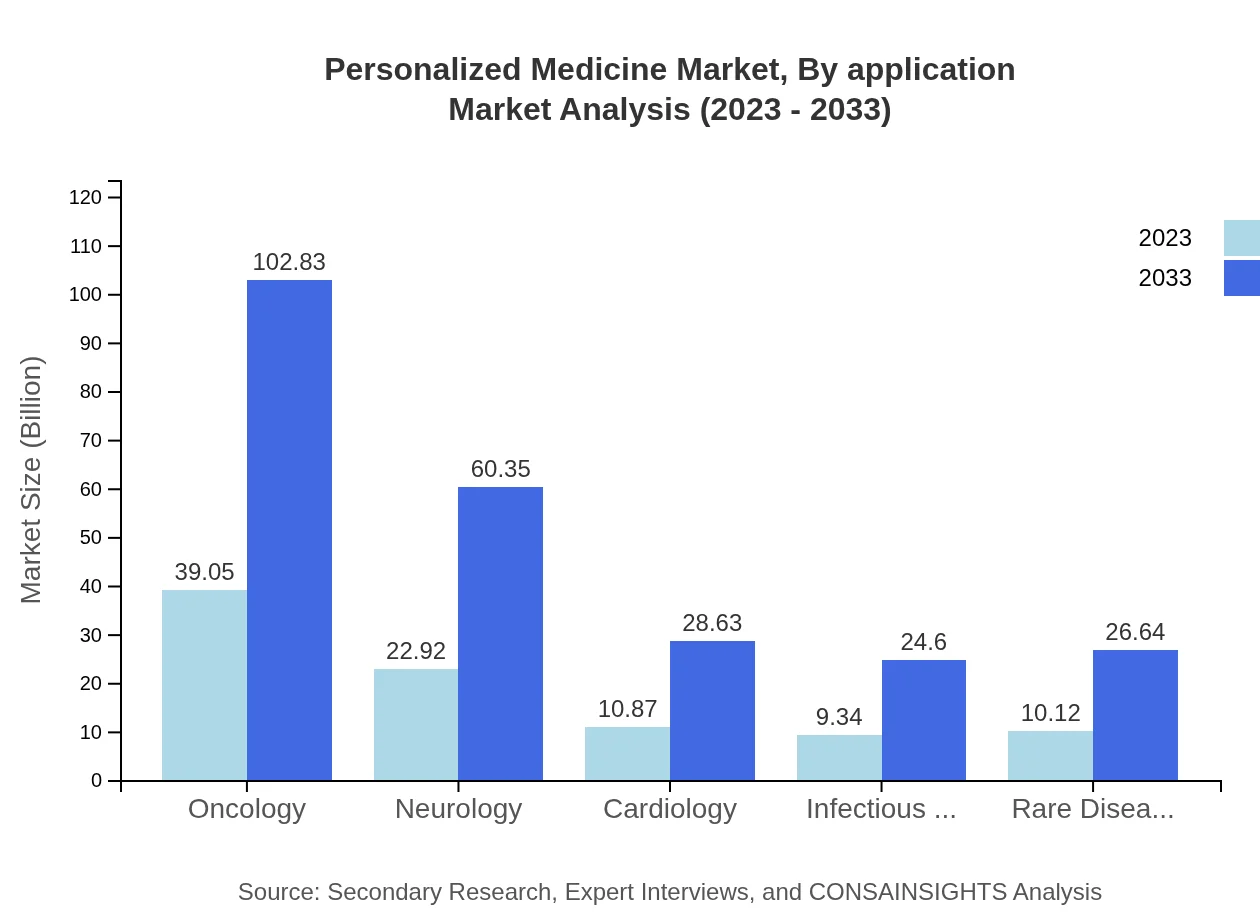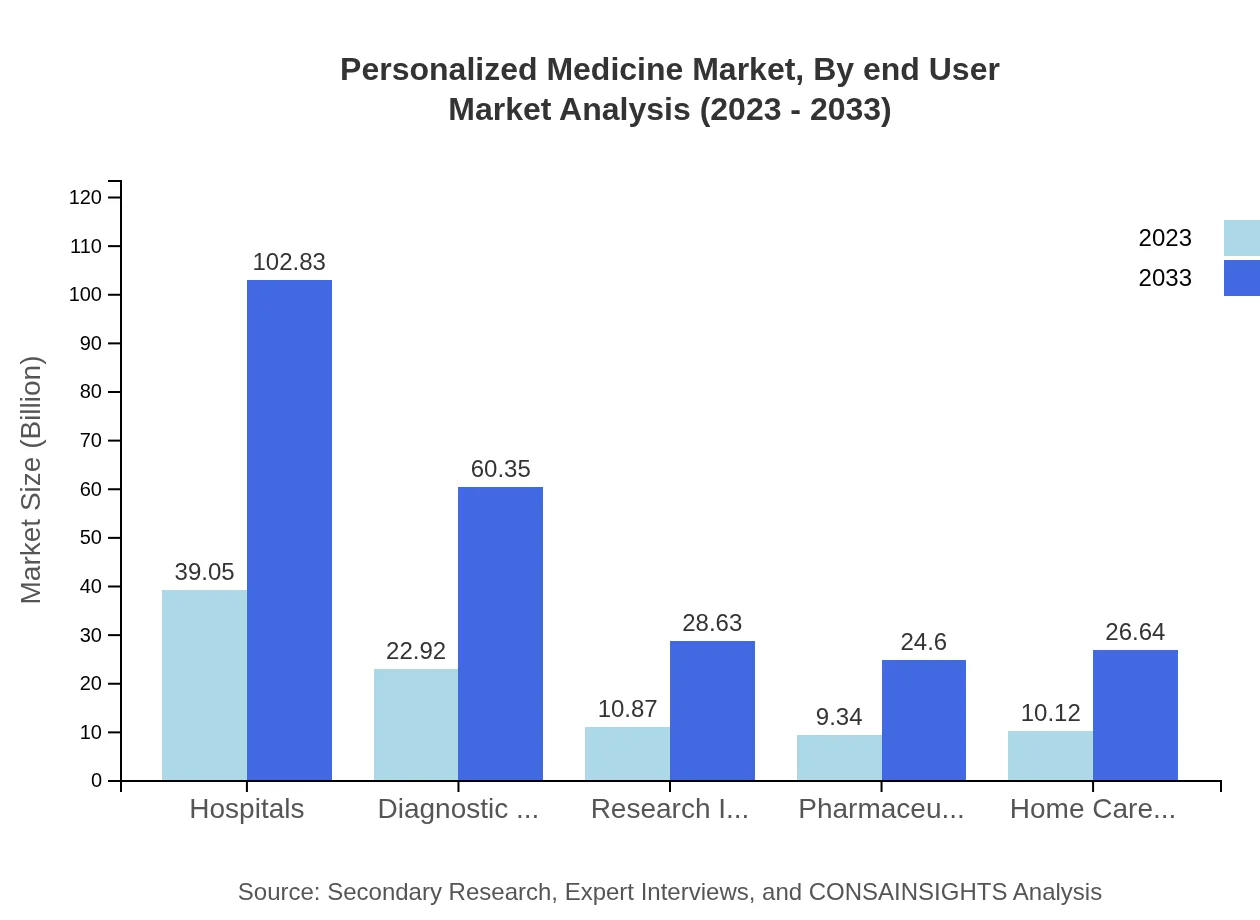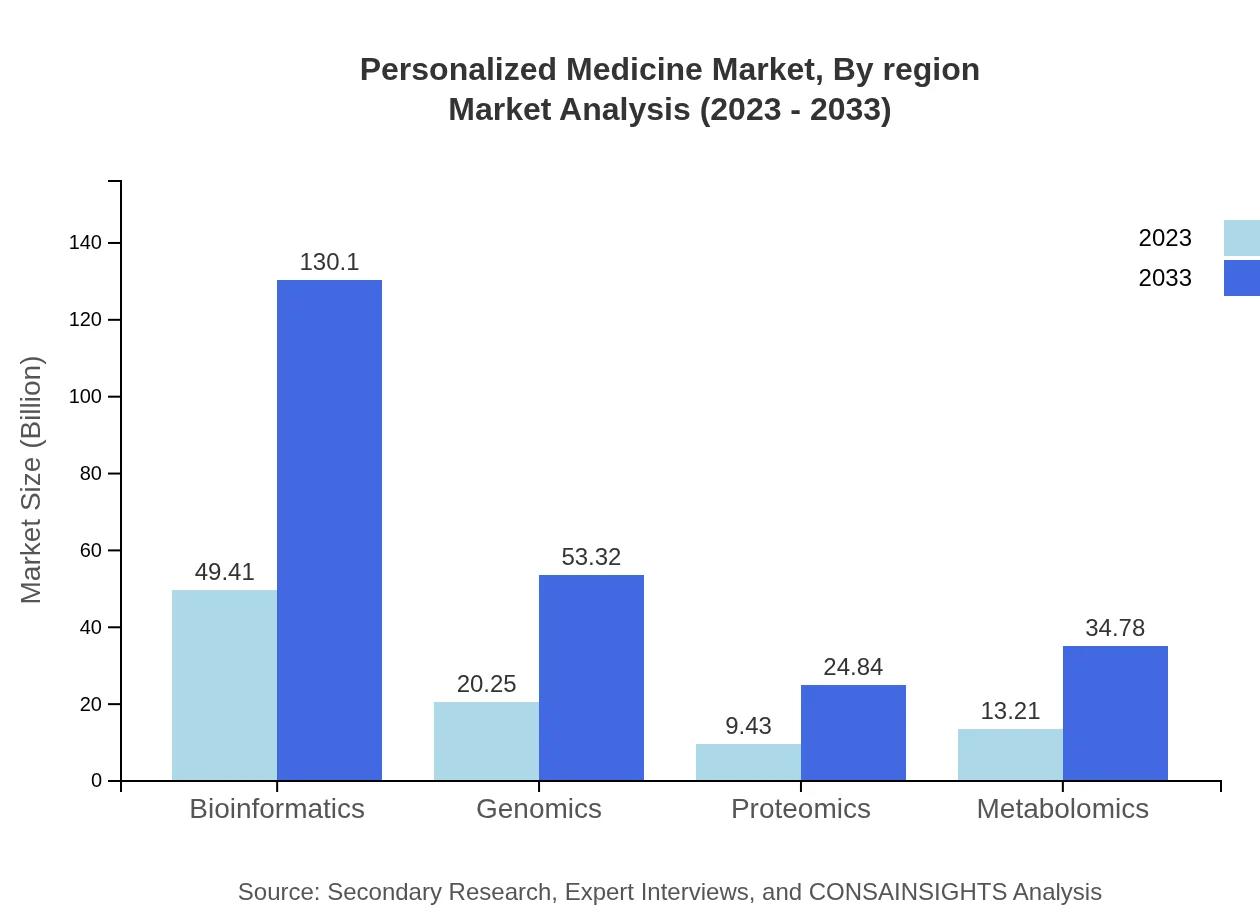Personalized Medicine Market Report
Published Date: 31 January 2026 | Report Code: personalized-medicine
Personalized Medicine Market Size, Share, Industry Trends and Forecast to 2033
This report presents an in-depth analysis of the Personalized Medicine market, covering insights into the market dynamics and projections from 2023 to 2033. It includes market sizes, technology trends, segment performance, and key players shaping the industry.
| Metric | Value |
|---|---|
| Study Period | 2023 - 2033 |
| 2023 Market Size | $92.30 Billion |
| CAGR (2023-2033) | 9.8% |
| 2033 Market Size | $243.05 Billion |
| Top Companies | Illumina, Inc., Roche Diagnostics, Thermo Fisher Scientific, Pfizer, Inc., Novartis |
| Last Modified Date | 31 January 2026 |
Personalized Medicine Market Overview
Customize Personalized Medicine Market Report market research report
- ✔ Get in-depth analysis of Personalized Medicine market size, growth, and forecasts.
- ✔ Understand Personalized Medicine's regional dynamics and industry-specific trends.
- ✔ Identify potential applications, end-user demand, and growth segments in Personalized Medicine
What is the Market Size & CAGR of the Personalized Medicine market in 2023 and 2033?
Personalized Medicine Industry Analysis
Personalized Medicine Market Segmentation and Scope
Tell us your focus area and get a customized research report.
Personalized Medicine Market Analysis Report by Region
Europe Personalized Medicine Market Report:
Europe's Personalized Medicine market is expected to grow substantially, from USD 24.91 billion in 2023 to USD 65.60 billion by 2033. This growth is fueled by an aging population, increased prevalence of chronic diseases, and strong government support for precision medicine initiatives.Asia Pacific Personalized Medicine Market Report:
The Asia Pacific region is witnessing rapid growth, with the market expected to increase from USD 18.02 billion in 2023 to USD 47.44 billion by 2033. The growth is driven by rising investments in biotechnology and healthcare infrastructure, growing patient awareness, and increasing adoption of personalized therapies, especially in countries like China and India.North America Personalized Medicine Market Report:
North America remains a leader in the Personalized Medicine market, with a size of USD 31.45 billion in 2023 projected to expand to USD 82.81 billion by 2033. The region benefits from advanced healthcare systems, significant R&D investments, and high levels of patient and clinician awareness regarding personalized therapies.South America Personalized Medicine Market Report:
The South American market is anticipated to grow from USD 5.86 billion in 2023 to USD 15.43 billion by 2033. Factors contributing to this growth include increasing healthcare expenditure, improved regulatory frameworks, and gradual acceptance of personalized medicine practices in the region.Middle East & Africa Personalized Medicine Market Report:
The Middle East and Africa region shows promising growth, with the market projected to reach USD 12.06 billion in 2023 and USD 31.77 billion by 2033. Emerging trends include rising healthcare investments and increased interest in personalized medicine in the Gulf Cooperation Council (GCC) countries.Tell us your focus area and get a customized research report.
Personalized Medicine Market Analysis By Product
In terms of products, diagnostics hold a significant share as they are critical in determining the appropriate therapeutic regimen for patients. This segment emphasizes the use of biomarkers and diagnostic tools to personalize treatment plans according to individual genetic profiles.
Personalized Medicine Market Analysis By Application
Applications of personalized medicine span across numerous disease areas, including oncology, cardiology, infectious diseases, and rare diseases. Oncology is the leading application area as targeted therapies revolutionize cancer treatment, making it more effective and less invasive.
Personalized Medicine Market Analysis By End User
End users include hospitals, diagnostic laboratories, and pharmaceutical companies. Hospitals represent the largest segment as they implement personalized treatment protocols in real-time patient management, significantly enhancing the quality of care.
Personalized Medicine Market Analysis By Region
Technological advancements such as next-generation sequencing, CRISPR technology, and bioinformatics are redefining personalized medicine. These technologies enable better identification of genetic markers and disease predispositions, facilitating the development of tailored therapies.
Personalized Medicine Market Trends and Future Forecast
Tell us your focus area and get a customized research report.
Global Market Leaders and Top Companies in the Personalized Medicine Industry
Illumina, Inc.:
Illumina is a leader in genomic sequencing and analysis, providing technological advancements that enable the effective implementation of personalized medicine approaches.Roche Diagnostics:
Roche is renowned for its innovative diagnostics and therapeutic solutions in the field of personalized medicine, particularly for oncology and chronic disease management.Thermo Fisher Scientific:
Thermo Fisher Scientific offers a wide range of tools, services, and reagents that crucially support personalized medicine research and clinical application.Pfizer, Inc.:
Pfizer is actively involved in developing targeted therapies and companion diagnostics, driving advancements in personalized medicine in various therapeutic areas.Novartis:
Novartis focuses on precision medicine with a strong portfolio of therapies tailored to specific genetic profiles, especially in oncology and immunology.We're grateful to work with incredible clients.









FAQs
What is the market size of personalized Medicine?
The global personalized medicine market is valued at approximately $92.3 billion in 2023 and is projected to grow at a CAGR of 9.8%, indicating significant growth potential and evolving technologies in this sector over the next decade.
What are the key market players or companies in this personalized Medicine industry?
The personalized medicine industry comprises major players such as Illumina, Roche, Novartis, and Thermo Fisher Scientific. These companies are pivotal in innovating and shaping the landscape of personalized healthcare through biotechnology and precision treatments.
What are the primary factors driving the growth in the personalized Medicine industry?
Key drivers of growth in personalized medicine include advancements in genomics, increased demand for tailored healthcare solutions, rising spending in healthcare, and growing awareness among patients and providers about the benefits of personalized treatments.
Which region is the fastest Growing in the personalized Medicine?
The Asia Pacific region is anticipated to be the fastest-growing market for personalized medicine, expanding from $18.02 billion in 2023 to $47.44 billion by 2033, driven by increased healthcare investments and rising awareness of personalized healthcare.
Does ConsaInsights provide customized market report data for the personalized Medicine industry?
Yes, ConsaInsights offers customized market report data tailored to the personalized medicine industry, allowing clients to access specific insights and analytics suited to their unique business needs and strategic goals.
What deliverables can I expect from this personalized Medicine market research project?
From the personalized medicine market research project, you can expect detailed reports including market size analysis, growth forecasts, segment performance data, competitive landscape assessments, and strategic recommendations for stakeholders.
What are the market trends of personalized medicine?
Emerging trends in personalized medicine include increased integration of bioinformatics, growing use of genetic testing, expansion of precision therapies, and greater emphasis on individualized treatment protocols within healthcare systems.

